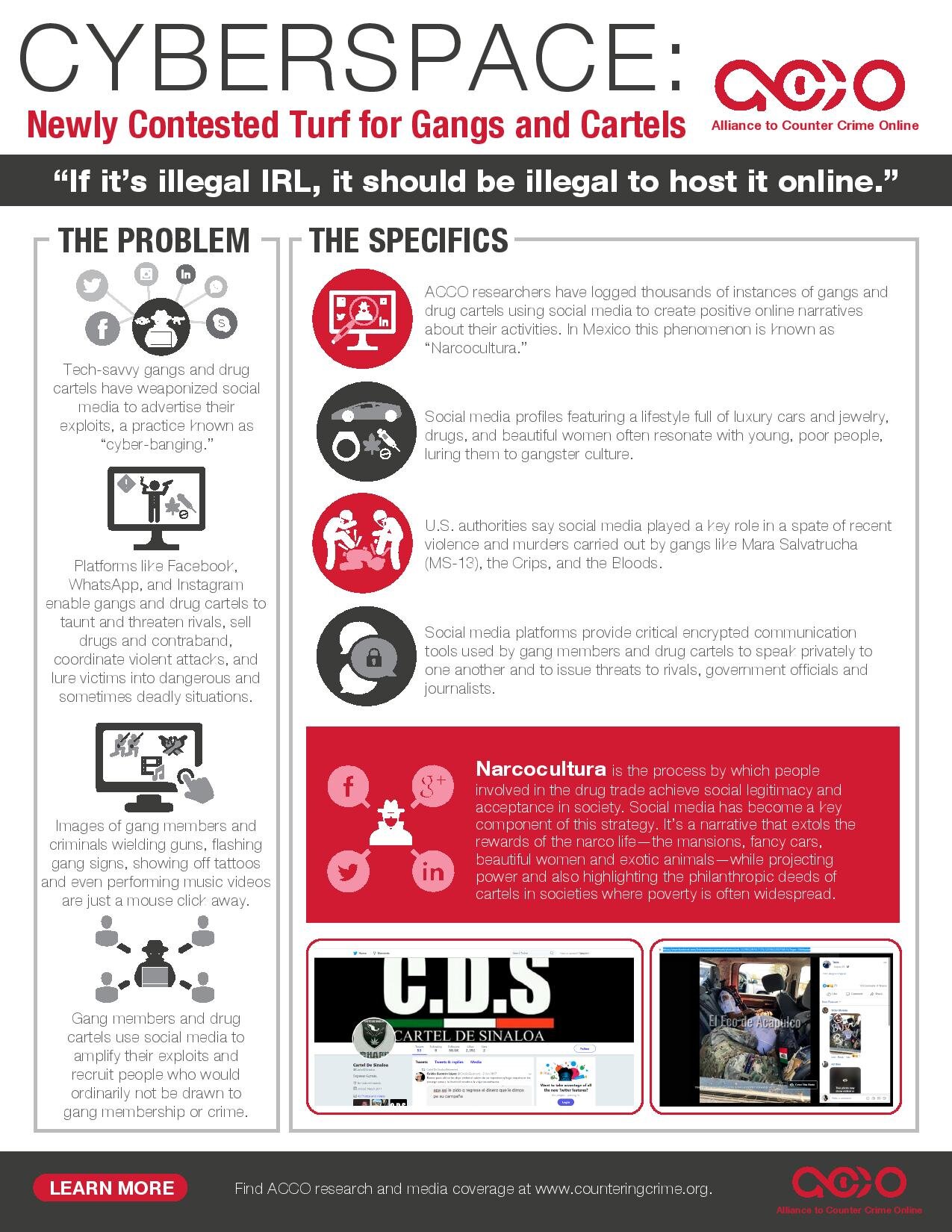Cyberspace: Newly Contested Turf for Gangs and Cartels
The Problem
Tech-savvy gangs and drug cartels have weaponized social media to advertise their exploits, a practice known as “cyber-banging.”
Platforms like Facebook, WhatsApp, and Instagram enable gangs and drug cartels to taunt and threaten rivals, sell drugs and contraband, coordinate violent attacks, and lure victims into dangerous and sometimes deadly situations.
Images of gang members and criminals wielding guns, flashing gang signs, showing off tattoos and even performing music videos are just a mouse click away.
Gang members and drug cartels use social media to amplify their exploits and recruit people who would ordinarily not be drawn to gang membership or crime.
The Specifics
ACCO researchers have logged thousands of instances of gangs and drug cartels using social media to create positive online narratives about their activities. In Mexico this phenomenon is known as “Narcocultura.”
Narcocultura is the process by which people involved in the drug trade achieve social legitimacy and acceptance in society. Social media has become a key component of this strategy. It’s a narrative that extols the rewards of the narco life—the mansions, fancy cars, beautiful women and exotic animals—while projecting power and also highlighting the philanthropic deeds of cartels in societies where poverty is often widespread.
Social media profiles featuring a lifestyle full of luxury cars and jewelry, drugs, and beautiful women often resonate with young, poor people, luring them to gangster culture.
U.S. authorities say social media played a key role in a spate of recent violence and murders carried out by gangs like Mara Salvatrucha (MS-13), the Crips, and the Bloods.
Social media platforms provide critical encrypted communication tools used by gang members and drug cartels to speak privately to one another and to issue threats to rivals, government officials and journalists.
Key Facts and Figures
Mexico’s notorious Sinaloa drug cartel has more than 100,000 Twitter followers from around the world.
About one quarter of the Sinaloa cartel’s social media output presents seductive images of gang life and another 22% contains threatening messages and images of torture, mutilations and executions.
In 2016, Brazilian authorities arrested a Facebook VP after the company refused to provide investigators access to WhatsApp messages pertinent to a drug-trafficking probe.
Mexico’s Zetas cartel has used YouTube to broadcast killings and Twitter to announce murdersin one instance tweeting pictures of the corpse from the victim’s own account.
Mexican drug cartels broadcast "narcocorridos," or drug ballads, on Twitter and YouTube to indicate targeted killings have occurred.
A video purportedly showing drug cartel members pointing weapons at captured rivals was taken down by YouTube a year after being viewed more than 1.8 million times.
Los Zetas cartel of Mexico has broadcast murders on social media and has a Facebook universe with approximately 47,000 connected accounts.
Current Law
Thanks to Section 230 of the 1996 Communications Decency Act (CDA230), social media platforms enjoy broad immunity for hosting user-generated content, even in cases when they know that the content facilitates violent and illegal activity. Moreover, victims of gang violence have no recourse if they are harmed as a result of online activity.
Authorities in multiple countries have subpoenaed evidence from major tech platforms, which have in turn refused to hand over data related to violent gang and drug cartel activity.
Proposed Legal Reform
It’s time for Congress to reform CDA230 and explicitly strip out immunities for hosting illicit content, and to provide victims of drug cartel and gang violence a path to justice if they were harmed online. By reforming CDA230, lawmakers could make it incumbent on tech firms to cooperate and hand over evidence of illegal activity to law enforcement. If this reform doesn’t occur, current campaigns to improve user privacy could have the unintended consequence of making the Internet a safer place for criminals and violent gangs.
ACCO’s Mission
The Alliance to Counter Crime Online is a team of security experts, academics, NGO leaders, and citizen investigators who have come together to push organized crime and terror activity off Internet platforms.





